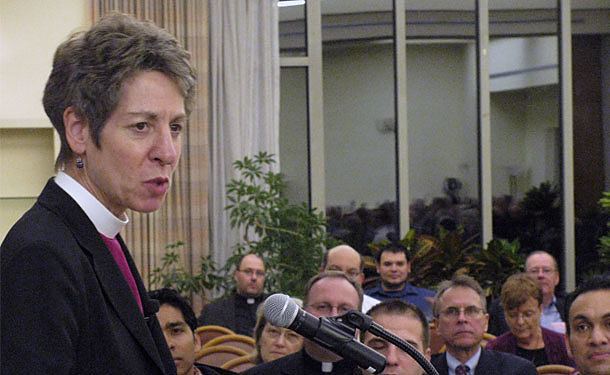January 23, 2011
 Most Rev. Katharine Jefferts Schori, presiding bishop and primate of the Episcopal Church, delivers the 2011 Hecker Lecture Jan. 19 at the North American Paulist Center in Washington, D.C. The title of the talk was: “A catholic future: Shared mission beyond unitary communions.”
Most Rev. Katharine Jefferts Schori, presiding bishop and primate of the Episcopal Church, delivers the 2011 Hecker Lecture Jan. 19 at the North American Paulist Center in Washington, D.C. The title of the talk was: “A catholic future: Shared mission beyond unitary communions.” Father Paul Huesing, CSP, introduces the guest speaker for the 2011 Hecker Lecture, Most Rev. Katharine Jefferts Schori, presiding bishop and primate of the Episcopal Church.
Father Paul Huesing, CSP, introduces the guest speaker for the 2011 Hecker Lecture, Most Rev. Katharine Jefferts Schori, presiding bishop and primate of the Episcopal Church.Christians must work with one another and those outside the religious sphere to have an impact on the world.
That was the message of Most. Rev. Katharine Jefferts Schori, presiding bishop and primate of the Episcopal Church in delivering the annual Hecker Lecture Jan. 19 at the North American Paulist Center in Washington, D.C.
The Hecker Lecture – named for Paulist Fathers founder Father Isaac T. Hecker – has been a tradition in the Washington theological community for more than 40 years. In each case, a guest speaker is invited to expound or reflect upon one of the core aspects of Paulist spirituality: evangelization, ecumenism, interfaith relations or reconciliation.
“This year our emphasis is on ecumenism,” said Father Paul Huesing, CSP, director of formation for the Paulist Fathers who introduced Bishop Jefferts Schori and her talk, titled: A catholic future: Shared mission beyond unitary communions.
“That is an interesting title,” Father Huesing continued. “It connotes at once realism, duty, hope and the acknowledgement of a shared and sacred core tradition.
“We hope that our … time together will contribute to mutual understanding and friendship between our churches,” he said. “This is a friendship important to the broader Christian community and the American society at large. … the friendship between our two communities is still there. It will and must grow.”
Bishop Jefferts Schori, 56, shepherded the Episcopal community in Nevada before assuming the leadership role of presiding bishop in 2006. She is a doctoral-level research scientist, oceanographer, accomplished SCUBA diver and licensed pilot. Bishop Jefferts Schori and her husband have a daughter who serves as a pilot in the U.S. Air Force.
Bishop Jefferts Schori began her talk by reminding the audience that Roman Catholics and Episcopalians are the respective heirs of different strands of western Christianity.
“… Many people erroneously believe that the big conflict came at the time of the Reformation and Counter-Reformation. … the roots are much older,” she said. “The points of difference between our respective communions are, to this day, rooted in different responses to contextual diversity. How shall the faith develop, or be permitted to develop, in the face of differing local conditions, challenges and gifts?
“Once we recognize the common ground, perhaps we may be able to move behind singular answers to highly particular challenges, at least in certain spheres,” Bishop Jefferts Schori continued. “We share a common belief in the reign of God, in the sacramental presence of God in the earthly realm, and in the necessity of human participation in God’s mission.”
Bishop Jefferts Schori said that to live out our common baptismal call to engage in God’s mission “is likely going to mean that we look for partners in other faith traditions and Christian communities, as well as groups outside the formal religious world.”
“We’re also going to have to be willing to look at new models, new ways of serving God’s mission,” she said. “… The work of sharing good news is going to have to be far more creative than either of our communions has known before. We need to go out from our comfortable houses of worship into what is often unexplored territory. The world needs the gifts of all of us if we’re going to begin to help people makes sense of the bad news of their own lives – violence, hopelessness, and meaninglessness. The need for spiritually-gifted community is immense, and it’s far more than either of us can accomplish alone.”
In concluding her talk, Bishop Jefferts Schori said we can only begin to face the challenges of today’s world by working with “people of faith of all sorts, who seek a healed and more just world.”
“Neither of our religious communities is large enough, gifted enough, or extensive enough to respond to these challenges,” she said. “We will be faithless if we fail to work with all possible partners in seeking a truly catholic response to God’s mission to heal this world, to restore all that is to right relationship with God, and each other, in Christ.”